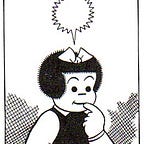Writing
Naming Your Characters
Don’t overlook the story potential in your characters’ names.
When Ex Machina, a feature film about artificial intelligence written and directed by Alex Garland, was released in 2015, reviewers called it a “futuristic shocker” and a “dazzling sci-fi thriller,” praising its sleek design — the film won the Academy Award for visual effects — and sly philosophical underpinnings. Another striking aspect of the movie got less attention: the way its characters’ names foretell their motives and actions.
I recently re-watched Ex Machina. Once again I was impressed by the significance of the characters’ names. And once again I reflected on how and why some fictional characters’ names are more resonant and memorable than others.
Take a look at the three principal characters in Ex Machina. At the center of the action is a bearded tech mogul, Nathan Bateman (Oscar Isaac), with delusions of omnipotence. A weedy, whip-smart employee, Caleb Smith (Domhnall Gleeson), wins a corporate contest and is helicoptered into Bateman’s remote compound for an experiment: to determine whether Bateman’s creation, a cyborg called Ava (Alicia Vikander), is sufficiently human-like to pass the Turing Test.
The names are ordinary enough. Or are they?
